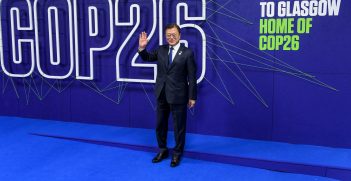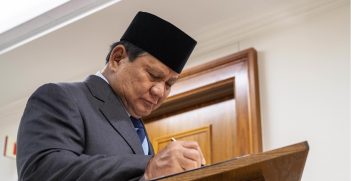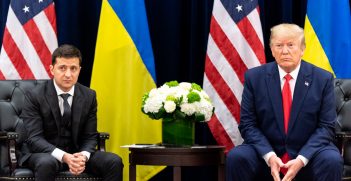Indonesia Elections: Shades of Suharto in President Joko Widodo's Legacy

Joko Widodo will end his presidency with an ominous legacy, dynastic building and corruption. Many are concerned a broader erosion of democracy will follow the elections.
Joko Widodo (Jokowi) and Suharto came to power in different times, (Suharto 1966-1998 and Jokowi 2014-2024) yet even today they share many similarities. Both have glorified economic development and were ready to sacrifice basic freedoms in order to create political stability for development. Relying on state revenues from natural resource extraction, Jokowi’s development agenda has been focused around Nickel with China and the Middle East as the main source of investment; for Suharto it was Petroleum with closer ties and investment from US and Western countries.
As the presidential election continues at the polls, several tendences of the Suharto era (he ruled for 32 years by manipulating the elections) have remerged. For Jokowi, the attempt to extend presidential limits and so rule for longer first begin in 2021. The idea was proposed by several people close to the president, but was initially rejected by him. Jokowi later backtracked and discussed the removal of limitations with party chairs. The later proposal was rejected by Megawati Sukarnoputri, the fifth president of Indonesia and Chair of the Indonesian Democratic Party of Struggle, who, in referring to the provisions of Article 7 of the 1945 Constitution of the Republic of Indonesia, outlined a two term limit.
Jokowi has since pushed his son – Gibran Rakabuming Raka – to become a vice presidential candidate even though he is still too young, in Indonesian constitutional terms, for the role. It is alleged that Jokowi then asked his brother-in-law, Chairman of the Constitutional Court, to revise Article 169 letter q of Law No. 7 of 2017, which was then subsequently announced. That landmark ruling was pushed through unilaterally without any major resistance or review, creating a stir in Indonesian politics and leading to the characterisation of Gibran as the illegitimate child of the constitution.
To ensure his son’s victory, Jokowi openly invited voters to elect Gibran, who was paired with Prabowo Subianto as candidate No. 2. This proved a controversial invitation since the president said he would remain neutral in the elections. Naturally, there was significant opposition to this shift in presidential behaviour. On 22 January, when he paid a working visit to Central Java, Jokowi gave a two-finger salute to people who were standing along the road – this was in response to the song, enthusiastically sung by observers on the road, “oppose dynastic politics, let’s protect democracy….three finger salute, don’t vote for Jokowi’s child.” Jokowi appeared to be doubling down in support of his son, and he subsequently gave permission to all his ministers to campaign for Gibran, and emphasised that the president could campaign and take sides. This statement was delivered on January 24 2024.
Perhaps to avoid further annoyances, further working visits around the country included the removal of all campaign billboards andthe flags of all candidates. Interestingly, however, only the Prabowo-Gibran campaign billboards and flags were put back. This was undertaken by the local police, with assistance of the Municipal Police (Satpol PP), who carried out the removal under the orders of the interim regional heads. Currently, there are 123 of interim regional heads, all of whom will hold regional elections in November 2024. The interim regional heads were appointed by the Jokowi through the minister of Home Affairs and from among the State Civil Apparatus (ASN), and include several retired members of the Indonesian State Army (TNI) and the Indonesian National Police (Polri). The impartiality of the TNI and Polri is also often questioned because Jokowi preferred to appoint key lieutenants (predominantly loyalists from Solo, where Jokowi was Mayor from 2005-2023) to important positions, particularly the National Army Commander and Chief of the Republic of Indonesia Police. The minister of Home Affairs is also a retired police general.
Over the past two weeks statements of concern have been delivered by professors, lecturers, and students from more than 50 large university campuses. They are worried that Indonesia will fail to implement free and fair elections because the president and government officials are not neutral, they don’t reject dynastic political agendas, and they refuse to crack down on corruption and collusion. The situation reminds Indonesians of the year 1998, before Suharto stepped down. At that time, students took to the streets and occupied the parliament building in Senayan. They demanded the enforcement of the supremacy of law, the eradication of corruption, collusion and nepotism, and amendments to the constitution to limit the term of office of the president. These statements of concern illustrate that the situation is beginning to reach a point where such abuse can no longer be tolerated.
The similarities with Suharto are many, and if Jokowi’s political repression continues, another mass protest and perhaps more will be Jokowi’s legacy.
Dr Reni Suwarso is a faculty member at the Department of Political Science, Universitas Indonesia. Director, Institute of Democracy, Security and Strategic Studies, Senior Fellow at Australia-Indonesia Center, and Social Team Leader of Citarum Action Research Project, Universitas Indonesia -Monash University.
This article is published under a Creative Commons License and may be republished with attribution.





